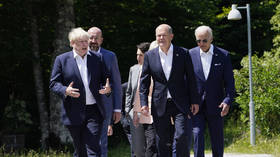NATO summit kicks off in Spain
The increase of forces, aid to Ukraine, and the bloc’s further expansion are on the agenda
NATO, the US-led military bloc, kicked off its annual three-day summit in Madrid on Tuesday.
The 30-member organization will focus on strengthening its forces in Europe and elsewhere in the wake of Russia’s military campaign in Ukraine, which was launched in late February. Members are also expected to discuss more aid to Kiev, as well as the prospect of Sweden and Finland joining the bloc.
NATO Secretary-General Jens Stoltenberg said on Monday that the bloc would increase the number of its rapid-response troops from roughly 40,000 to “well over” 300,000. He labeled Russia “the most significant and direct threat.”
The meeting is taking place on the heels of the G7 summit in southern Germany, where the leaders of the US, Canada, Britain, France, Germany, Italy, Japan and the EU pledged to support Ukraine “for as long as it takes.”
NATO members are also expected to discuss further military and financial aid to Ukraine. Since February, the allies have increasingly supplied heavy weapons to Kiev, including various missile systems, howitzers, combat drones, armored vehicles, radars and helicopters. The most-recent reports said that the US was purchasing Norwegian-developed NASAMS medium-to-long range surface-to-air missile systems.
Russian President Vladimir Putin said in February that NATO’s expansion eastward and attempts to set up “a foothold” in Ukraine were one of the reasons why Russian troops attacked Ukraine. NATO denied that its forces and military sites posed a threat to Russia.
NATO will adopt the revised Strategic Concept, the bloc’s key document, which provides an assessment of the current security environment. Stoltenberg said that, apart from Russia, the document will address China for the first time.
Sweden and Finland are attending the event for the first time after both previously non-aligned countries formally applied to join NATO in May. Turkey said it would bloc their membership, accusing the two Nordic states of harboring people linked to Kurdish organizations, which Ankara considers terrorist groups.
Reuters quoted Turkish officials and Western diplomats on Monday as saying that a breakthrough over the issue of Sweden’s and Finland’s membership was “unlikely.”






Comments are closed.